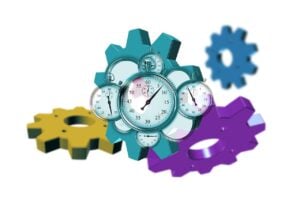Breaking The Chains Of Hierarchy: Why 'Nonlawyer' Must Go
The term is more than just a label; it reflects outdated hierarchies and is a barrier to a more inclusive and collaborative legal environment.
 In the ever-evolving landscape of the legal profession, certain terminologies and labels can shape perceptions and the dynamics within legal teams. One such term, “nonlawyer,” has sparked considerable debate with the recent Petition for the American Bar Association (ABA) to Cease Using the Term “Nonlawyer.” To explore this topic, Chere Estrin, a seasoned legal professional and thought leader, will share her insights on why the term “nonlawyer” is problematic and how it impacts the legal community. Chere will explore the historical context of job titles within the legal sector, the effects of this terminology on professional identity, and the potential benefits of moving away from such labels. Let’s hear from Chere on why it’s time for a change in how we refer to vital members of legal teams.
In the ever-evolving landscape of the legal profession, certain terminologies and labels can shape perceptions and the dynamics within legal teams. One such term, “nonlawyer,” has sparked considerable debate with the recent Petition for the American Bar Association (ABA) to Cease Using the Term “Nonlawyer.” To explore this topic, Chere Estrin, a seasoned legal professional and thought leader, will share her insights on why the term “nonlawyer” is problematic and how it impacts the legal community. Chere will explore the historical context of job titles within the legal sector, the effects of this terminology on professional identity, and the potential benefits of moving away from such labels. Let’s hear from Chere on why it’s time for a change in how we refer to vital members of legal teams.
Olga V. Mack: Could you explain why you believe the term “nonlawyer” is problematic in the legal profession?
Chere Estrin: “Nonlawyer” stands out not for its inclusivity but its exclusivity. It’s a label that reeks of hierarchy, casting those it describes into a shadow of what they are not rather than illuminating what they are. This linguistic relic perpetuates a caste system within legal support roles, unjustly positioning certain professionals as secondary and less important to the omnipotent “lawyer.”

A Law Firm Checklist For Successful Transaction Management

By prefixing roles with “non,” we implicitly suggest that the lawyer is the only significant figure in the legal landscape. Paralegals, legal assistants, and other support staff are relegated to subordinate positions.
OM: How does the label “nonlawyer” affect the professional identity and self-perception of legal support staff and other professionals within legal environments?
CE: “Nonlawyer” perpetuates a hierarchy that can lead to feelings of inferiority and inadequacy. Being constantly reminded of what they are not — lawyers == can diminish their sense of value and contribution to the legal team.
Comparisons to other professions highlight the unique stigma attached to being labeled a “nonlawyer.” For example, teachers are not referred to as “nonprincipals,” and nurses are not labeled as “nondoctors.” Associates are not referred to as “nonpartners.” Focus on lawyers as the central figure overlooks the collaborative nature of legal work. A single individual rarely wins legal cases; rather, they require collective efforts.
Sponsored

Trust The Process: How To Build And Manage Workflows In Law Firms

A Law Firm Checklist For Successful Transaction Management


How To Build And Manage Your Law Firm Rate Sheet

Not All Legal AI Is Created Equal

OM: Can you discuss the historical evolution of job titles within the legal sector and how they reflect broader changes in the profession’s view on role importance and inclusivity?
CE: Initially, the “Legal Secretary” title was predominant. As roles evolved to include tasks traditionally associated with paralegals, such as legal research and drafting, the term “Legal Assistant” emerged. This change was partly driven by the realization that certain tasks could be billable, unlike traditional secretarial duties. The term “secretary” was seen as outdated in the corporate world, prompting the shift to a more modern title. As the responsibilities of support staff continued to diversify, firms transitioned to “Legal Support Specialists.” reflecting broader restructuring within firms.
Originally, “Legal Assistant” and “Paralegal” were interchangeable, leading to confusion. To address this, the American Bar Association approved “Paralegal” as the primary title. The trend toward specialization is expected to continue, driven by technological advancements and cost-effectiveness. The profession can align with evolving industry standards and enhance inclusivity and clarity within the workforce.
OM: Looking ahead, how do you envision the impact of removing the term “nonlawyer” on the culture and operational dynamics within legal practices?
CE: Removing the term would undoubtedly reshape culture and operations. Today, respect, recognition, and dignity are paramount. Clinging to terminology like “nonlawyer” is not just archaic; it’s detrimental to morale.
Sponsored

Not All Legal AI Is Created Equal


How Savvy Lawyers Build Their Law Firm Rate Sheet
Technological advancements are revolutionizing work, and firms must adapt or risk obsolescence. Few attorneys have a legal assistant who takes dictation and transcribes it. Paralegals who used to organize documents now draft pleadings merely. Embracing changes not only boosts efficiency but also enhances profitability.
Removing “nonlawyer” is about equality and inclusivity, signifying a shift toward more collaborative and successful firms. So, let us move beyond “nonlawyer” and embrace a more inclusive and empowering language that reflects the true value of every individual within the legal profession. Only then can we truly achieve equality and respect for all.
Chere Estrin’s insights shed light on the profound implications of terminology within the legal profession. The term “nonlawyer” is more than just a label; it reflects outdated hierarchies and is a barrier to a more inclusive and collaborative legal environment. By rethinking how we describe the roles within our teams, we can foster a culture that values all contributions, recognizes diverse expertise, and supports the professional growth of every individual, regardless of their title.
Moving away from the term “nonlawyer” is not merely a semantic shift; it’s a step toward dismantling ingrained hierarchies and embracing a more equitable professional landscape. As legal practices evolve with technological advancements and a growing emphasis on teamwork, it becomes imperative to recognize and celebrate the roles of all legal professionals. This change in perspective will enhance job satisfaction and morale and drive the profession towards greater efficiency and innovation.
Any legal firm’s success ultimately hinges on its team’s strength and unity. By valuing every member for their unique contributions and skills, we pave the way for a more dynamic, respectful, and successful future in law. It’s time we discard the divisive language of the past and move forward with terms that reflect the true collaborative spirit of the legal profession.
 Olga V. Mack is a Fellow at CodeX, The Stanford Center for Legal Informatics, and a Generative AI Editor at law.MIT. Olga embraces legal innovation and had dedicated her career to improving and shaping the future of law. She is convinced that the legal profession will emerge even stronger, more resilient, and more inclusive than before by embracing technology. Olga is also an award-winning general counsel, operations professional, startup advisor, public speaker, adjunct professor, and entrepreneur. She authored Get on Board: Earning Your Ticket to a Corporate Board Seat, Fundamentals of Smart Contract Security, and Blockchain Value: Transforming Business Models, Society, and Communities. She is working on three books: Visual IQ for Lawyers (ABA 2024), The Rise of Product Lawyers: An Analytical Framework to Systematically Advise Your Clients Throughout the Product Lifecycle (Globe Law and Business 2024), and Legal Operations in the Age of AI and Data (Globe Law and Business 2024). You can follow Olga on LinkedIn and Twitter @olgavmack.
Olga V. Mack is a Fellow at CodeX, The Stanford Center for Legal Informatics, and a Generative AI Editor at law.MIT. Olga embraces legal innovation and had dedicated her career to improving and shaping the future of law. She is convinced that the legal profession will emerge even stronger, more resilient, and more inclusive than before by embracing technology. Olga is also an award-winning general counsel, operations professional, startup advisor, public speaker, adjunct professor, and entrepreneur. She authored Get on Board: Earning Your Ticket to a Corporate Board Seat, Fundamentals of Smart Contract Security, and Blockchain Value: Transforming Business Models, Society, and Communities. She is working on three books: Visual IQ for Lawyers (ABA 2024), The Rise of Product Lawyers: An Analytical Framework to Systematically Advise Your Clients Throughout the Product Lifecycle (Globe Law and Business 2024), and Legal Operations in the Age of AI and Data (Globe Law and Business 2024). You can follow Olga on LinkedIn and Twitter @olgavmack.







